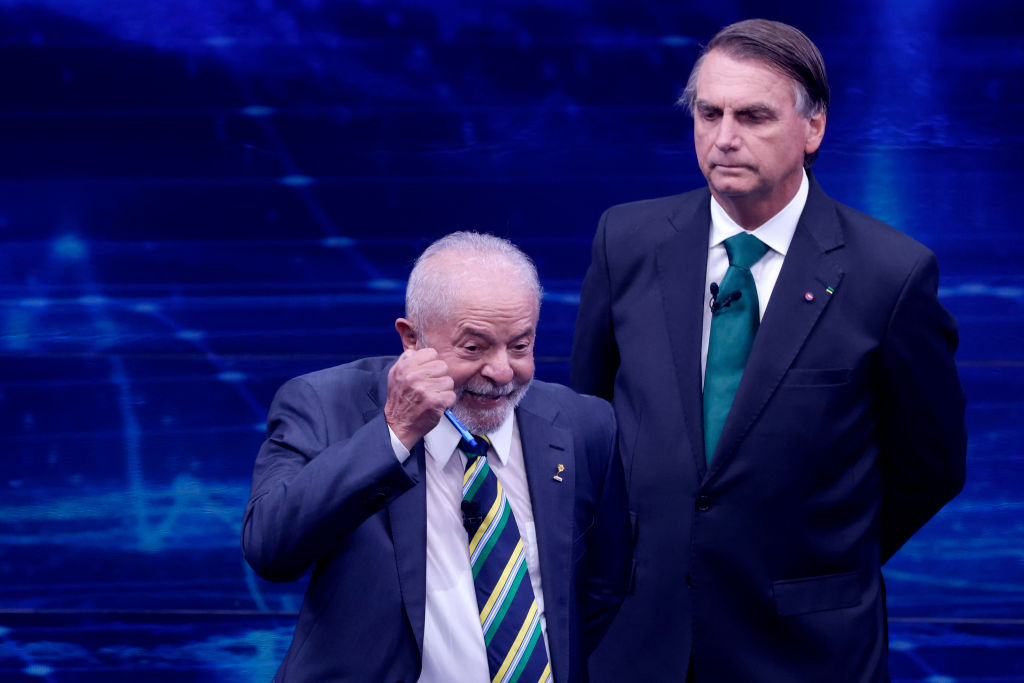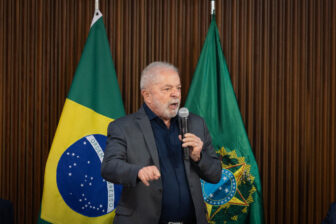SÃO PAULO — With polls tightening, a Bolsonaro victory on October 30 — seen as extremely unlikely until recently — no longer seems unthinkable. Indeed, while the majority of pollsters still see former president Luiz Inácio Lula da Silva ahead, Bolsonaro’s extraordinary spending spree of over 68 billion reais ($13 billion) during the past months seems to have provided the president with a sense of momentum. In addition, a more agile and unscrupulous digital strategy, including an avalanche of fake news shared by government supporters, and a series of missteps by the Lula campaign, including wobbly debate performances, explain why the final result may be much closer than expected.
Given that Lula has enjoyed a comfortable lead during most of the campaign, most analyses about the future of Brazilian politics and foreign policy use the return of the former leftist leader to power as the baseline scenario. In Western capitals around the world, numerous policymakers and commentators did little to hide their giddiness in the face of the former army captain’s seemingly flagging fortunes.
What would a Bolsonaro victory mean for Brazil and its place in the world? In many ways, the governing coalition of a second term would resemble that of the first, even though the so-called “technocratic faction” in Bolsonaro’s government, led by Finance Minister Paulo Guedes, would be less influential than during the first four years. While a second Bolsonaro government could be expected to continue to work towards debureaucratization and reducing external tariffs, Guedes would probably be powerless to stop Bolsonaro’s increasingly populist and fiscally irresponsible policies that have become more accentuated in recent months, and would be politically costly to reverse after reelection.
The “ideological faction,” temporarily weakened by the ouster of Foreign Minister Ernesto Araújo and Education Minister Milton Ribeiro, has received a significant boost recently by the stellar electoral performance of radical voices like former Family Minister Damares Alves, Magno Malta and Jorge Seif, who won Senate seats. A second Bolsonaro administration could thus be expected to place greater emphasis on social conservatism and culture wars, while the anti-China rhetoric would largely disappear, since Brazil would increasingly depend on Beijing given that its diplomatic isolation in the West would almost certainly deepen.
In addition, deforestation would likely increase. The triumph of candidates like former Environment Minister Ricardo Salles—elected to the Chamber of Deputies with more than 600,000 votes—paired with the lackluster showing of environmental icons such as Marina Silva—also elected to the Chamber but with 237,000 votes—would contribute to a further crackdown against environmental watchdogs such as Ibama.
Criticism of what can expected to be an ever-growing role for the armed forces in a second Bolsonaro government would contribute to Brazil’s diplomatic isolation in the West and in Latin America. Yet Brazil would likely continue to be an attractive destination for several kinds of foreign investments, particularly given the global volatility of food prices and Latin America’s distance from geopolitical tensions.
However, three reasons explain why the president would interpret reelection as a mandate for far more sweeping change during his second term.

To begin with, reelection would represent a triumph of historic proportions given the deep-seated anti-incumbency sentiment that has dominated Latin American politics for the past years. Indeed, a Bolsonaro win would end a remarkable string of no fewer than 14 free and fair elections in the region that saw incumbents or pro-government candidates lose to the opposition. Winning in the midst of such adverse macroeconomic circumstances would be a devastating blow to the Workers Party (PT), which built a remarkably large tent during the campaign and actively courted centrists over the past months. Bolsonaro would initially govern, just like during the years of 2019 and 2020, without an organized opposition, which was struggling to respond to Lula’s absence from the political scene. In the same way, defeat would probably leave the PT in deep disarray, potentially reeling for years before agreeing on who should lead the opposition against Bolsonaro.
Secondly, the election of anti-establishment candidates with authoritarian rhetoric in the midst of economic and political upheaval—as was the case in Brazil in 2018—offers the winner only limited legitimacy for radical change. After all, numerous voters merely supported the outsider to express their frustration with traditional political elites, but generally did not expect the winner to follow-up on his most radical ideas. Four years ago, the presence of Justice Minister Sergio Moro and Economy Minister Paulo Guedes was widely expected to have a moderating influence on the newly elected president. Reelection, however, generally emboldens radical leaders such as Hungary’s Viktor Orbán, Nicaragua’s Daniel Ortega or Venezuela’s Hugo Chávez, all of which only began to pursue explicitly anti-democratic strategies after being reelected—such as undermining the independence of the judiciary, putting pressure on the media or stuffing anti-corruption watchdogs with allies.
Finally, a second presidential term would allow president Bolsonaro to appoint two additional judges to the Supreme Court and potentially even attempt to put pressure on the court’s independence, for example by incentivizing Congress to lower justices’ retirement age. It would also allow the president to obtain broader support from the legislature and state governments, where numerous Bolsonaro allies have triumphed on October 2. Indeed, the Liberal Party (PL), which the president is part of, will boast a remarkable 99 representatives (out of 513) in Congress, making it the largest in the next legislative period. Bolsonaro would still be forced to engage in the backroom horse-trading typical of Brazil’s political system, known as “coalitional presidentialism”—which requires minority presidents to cobble together unwieldy coalitions in exchange for pork barrel—but he would probably face a much lower risk of impeachment than he did in the past two years.
Just like in countries such as Venezuela under Chávez, Hungary under Orbán, Nicaragua under Ortega and Turkey under Erdogan, where voters gave populists with authoritarian tendencies a second chance, Brazil’s democracy would face tremendous pressure if Bolsonaro were to triumph on October 30.







